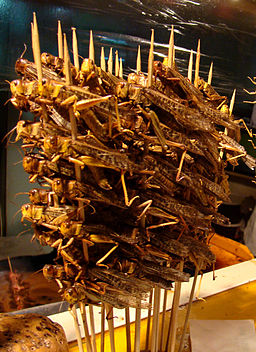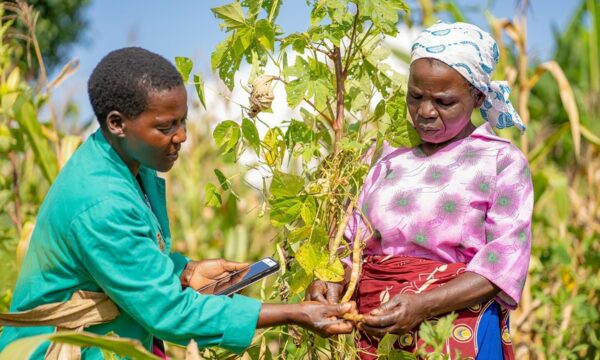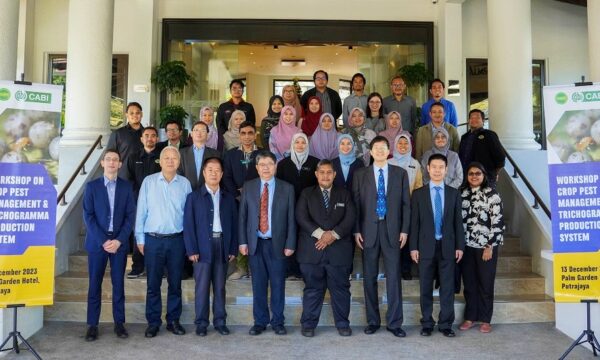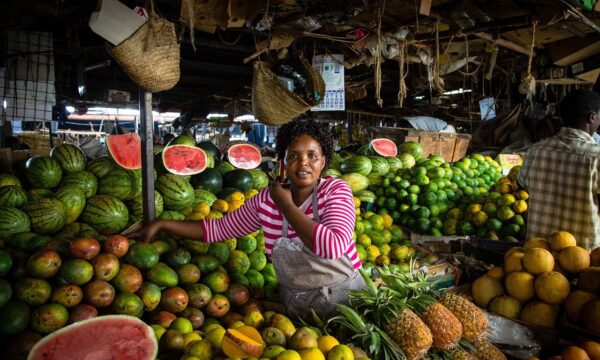
Deep-fried locust kebabs.CC BY 2.0
Many non-western cultures already eat insects [entomophagy]: in Thailand & China its a common streetfood as you can see in the picture, but its an unusual and frankly unheard of cuisine in the UK. AS you will see though, CABI staff have an interest in entomophagy AND we have blogged about global entomophagy before [Roasted grasshopper with a sprinkling of termites].
On 18th November 2015, studio guests, and listeners, of BBC Radio 4 – Midweek were treated to the experience of eating insects as food! Dr Sarah Beynon, an entomologist was a guest: she is on a mission to both educate the UK public on the importance of insects (including wasps and spiders) and to provide sustainable food by farming tropical insects.
She had brought in samples of insect protein which is on the menu at her café, The Grub Kitchen. The café is the latest venture for her Bugfarm in Wales, which functions as a research & education centre as well as providing dungbeetles for UK farmers to convert dung into compost!
Guests sounded wary but chef Michel Roux Jnr pronounced the chocolate cookie made with ground cricket flour, sugar and chocolate, as “very nice” and described it as both chocolatey and having a novel “meaty” taste. Another description was “marmity”: hardly surprising considering marmite was developed from yeast as an alternative to meat extract.
Weight for weight, we were told, cricket flour is higher in protein than beef.
Other delicacies available at the café include grasshoppers (taste like tea), mealworm hummus, and gourmet bug burgers containing mealworms, crickets and grasshoppers. By customer request coming soon will be burgers containing crunchy intact mealworms!
Food security for 2050: using insect protein will take the pressure off agricultural land
“WE need to look at new ways of producing food and we think this [tropical insect farming] is one of the ways of doing it” declared Dr. Beynon.
By 2050:
- we will need 70% more food
- if we rely on conventional meat production, we will need 50% more meat
- to reduce climate change, we need to limit carbon emissions. Livestock industry is already responsible for 7.5% of these emissions & we should be eating less meat
Her vision includes making the UK a centre for tropical insect farming…our own insects can rest easy as they don’t breed year round nor are as large as their tropical relatives. Tropical insects are 12-15x more efficient than meat animals in converting their food sources into protein.
2 billion people around the world eat insects
Insects provide an important additional source of protein and fat (and income) in traditional cultures and non-western countries.
Libby Purvis, the programme presenter, came well briefed. Libby’s examples of edible insects were flying ants (Zambia), spiders (Cambodia) and grasshoppers (Mexico).
I can reveal that, based on a quick search of CABI’s Global Health database, beetles, wasps, ants and caterpillars are eaten in the High Andes of Ecuador; wasps and bees in Japan and China; Thailand has insect streetfood (see image); and in Africa over 246 insect species are eaten.
Before you recoil & decide you just can’t read on, I’d remind you that French delicacies include snails (invertebrates just like insects) and honey, an insect product, is eaten in most cultures. People will eat whatever they find tasty, nutritious and available locally.
Insects as Animal Feed to meet demand for meat & fish… a role for CABI
CABI's research projects are focussed on food security, sustainable farming and biodiversity, and so we count as “one of the ways of doing it”. Insect-wise, usually we are trying to get rid of them as pests, encourage them as pollinators, use them as biological controls and a new project involves investigation of the spread of malarial mosquito habitat.
We are directly involved in insects as animal feed, through the EU funded programme ProteINSECT , which is running large scale trials with European farmers, to see if this is will help meet increased demand for meat and do so sustainably. Read more about CABI's role at Insects as Source of Protein
Dried maggots (fly larvae) or insect oils are added to animal feed (for fish, pigs, chicken and cattle) as a source of protein & evaluated for effectiveness and, critically, safety. Safety is key: there is the potential for insects to accumulate environmental toxins or transmit diseases to farm livestock, and so to us. Regulatory authorities such as EFSA know we cannot afford a repetition of BSE, when cattle feed was supplemented with sheep protein and so enabled a prion disease to cross the species boundary into cattle and humans.
CABI’ s databases reflect the state of research on Insects as food and feed
Insects as food is an actual term in CABI’s thesaurus: our earliest record going back to 1919 [“Beetles as Food and Medicine”], and records demonstrate the global importance of edible insects.
Using the following searchstring which eliminates the impact of insects on plant products:
((insect* AND de:feeds) NOT cabicode:FF100) OR de:"insects as food"
one retrieves from CAB abstracts (1549 records) & its archive (772 records) . On Global Health (636 records) & its its archive (193 records).
AS to be expected for an emerging research area, there is a dedicated journal Journal of Insects as Food and Feed (newly launched in 2015 and to be indexed by CABI’s databases).
I cannot tell you how surreal it felt as an Englishwoman to be reading up about the collection, cooking and marketing of insects.
Further Reading…chosen from CABI's Global Health database to appeal to your tastebuds!
- Risk profile related to production and consumption of insects as food and feed.
EFSA Journal, 2015, 13, 10, 4257. - Six-legged livestock: edible insect farming, collection and marketing in Thailand.
2013. Food and Agriculture Organization Regional Office for Asia and the Pacific, Bangkok, Thailand…Thailand is one of the few countries with a thriving insect farming sector! - Edible insects: future prospects for food and feed security. FAO Forestry Paper 2013 No. 171. Featuring 15 chapters, including the impact of harvesting insects in their natural habitats on the sustainability of forests.
- Insect diets: science and technology. 2015.Ed. 2. Cohen, A. C.; Cohen, A. C.; CRC Press
- Oryctes owariensis larvae as good alternative protein source: nutritional and functional properties. 2015. Annual Research & Review in Biology, 2015, 8, 3. A Cote D’Ivoire delicacy, larvae were dried, ground into a flour. Flour was high in protein (50%) & minerals, and suitable for sausages and bakery products.
- Biology and exploitation of the escamoles ant, Liometopum apiculatum Mayr (Hymenoptera: Formicidae). Acta Zoologica Mexicana, 2015, 31, 2, 251-264….Increased commercial demand for the edible pupae of these ants, & no regulations to control picking, is threatening their population.
In the News
It's Healthier To Eat A Bug Than It Is To Eat A Steak
Would you eat meat from animals fed on insects?
Related articles
1 Comment
Leave a Reply
Related News & Blogs
CABI shares its expertise at ICT for Development (ICT4D) Conference
CABI has shared its expertise in digital development for improved livelihoods and greater food security at the 12th Information Communication Technology for Development (ICT4D) Conference held in Accra, Ghana. Katherine Cameron, Head of Digital Advisor…
26 March 2024










This one is interesting topic. People have been reluctant on adopting the insect proteins to substitute the normal animal and grains proteins. Apart from roasting, we are fortifying our grain flour and also baked cakes with the insects proteins and see whether customers will adapt to the new product.once they feed on the insects indirectly then trying to make them eat directly will not be that hard.